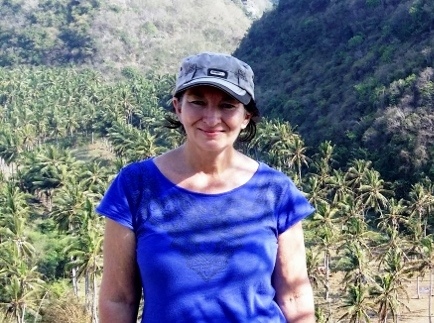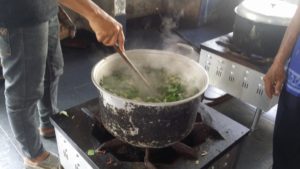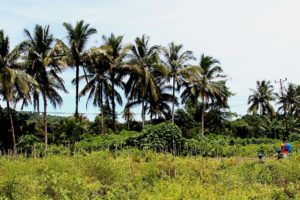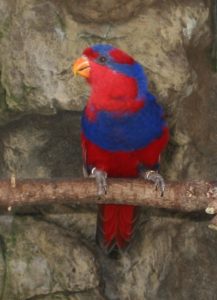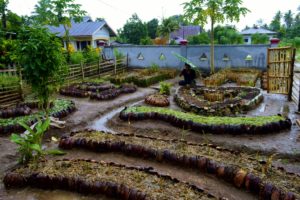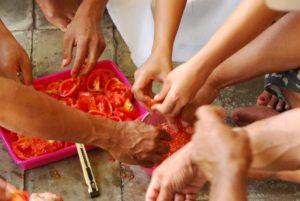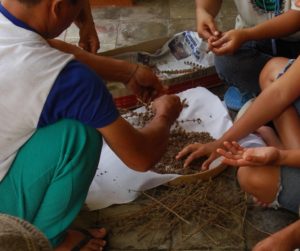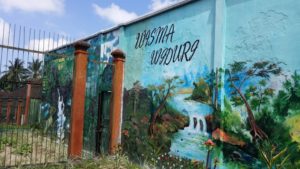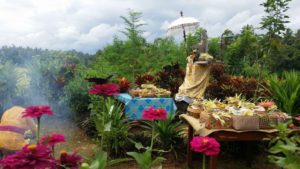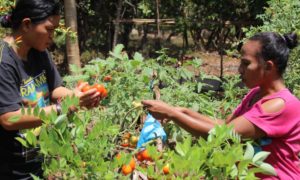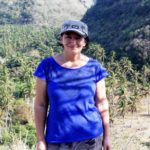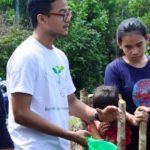In a race to create green economies, the IDEP Foundation is reviving local sustainability to regenerate ecosystems and restore traditional cultures across Indonesia.
IDEP Foundation is a grassroots nonprofit that helps rehabilitate prisoners, regenerate depleted farmland, restore damaged ecosystems, and revitalize local economies…all while renewing both cultural customs and the use of traditional food crops.
A world of catastrophe seemed to unfold after Asia’s financial crash of the 1990s, with poverty worsening from natural disasters and deforestation, the team of resilience experts began a mission to revive social strengths and protect natural resources in Indonesia, with bottom-up inclusive conservation that communities help to design according to local customs.
Under pressure nationwide by rapid industrial growth and globalization, Indonesia is evolving toward green economy models of “even distribution of wealth and environment protection by improving the welfare of locals,” say planning ministry officials, in the Jakarta Post, on halting forest destruction.
IDEP’s holistic approach to community development programs in disadvantaged, vulnerable regions – from Bali to remote islands in North Sulawesi, Sumatra, Flores, Sumba, and Papua, as well as training programs for prison inmates – helps people to help themselves by promoting human interconnectedness with nature and livelihood skills training in regenerative agriculture for land and water conservation.
Enabling conditions to restore health of damaged soils, protect watersheds and biodiversity, the NGO teaches smallholder farmers, women and youth about permaculture systems – how to grow organic food, save local seeds, turn waste into renewable energy and better incomes. Communities work on visions to reinvigorate or reinvent local economies, free from chemical cycles – learning to operate microenterprises, selling fresh produce and value-added products.
Reviving a toxic paradise
On Karekelang, a low tropical island in Indonesia’s far North Sulawesi, local farmers on this “former-paradise” recently waved a flag for help.
Organophosphates, classified hazardous but still used on crops worldwide, had poisoned the environment, health and livelihoods of this equatorial island, located within Coral Triangle marine sanctuary.
Used to combat invasive agricultural pest Sexava Coconut treehopper (Segestidea novaeguineae) that infests coconut plantations and other crops like banana and sago, the insecticide was sprayed by air over Karekelang in the 1970s. Now applied by injection to coconut tree trunks, the chemical is toxic to birds, mammals, amphibians, earthworms, honey bees, insects and microbes beneficial to healthy soils.
Threatening groundwater used by local villagers, who refuse to eat their own coconuts, urgent expertise was needed to rejuvenate their island home. Burdened for nutrition, farmers choosing divestment from coconut agriculture also required an alternative income source to supplement seasonal clove crops.
“Porodisa (paradise) has turned into a toxic island that is killing much of its endemics, especially the mascot of the island, sampiri”, said Michael Wangko, head of local group Kompak, IDEPs intervention partner on the island.
Classified Endangered on IUCN Red List, the “sampiri” or Red-and-blue Lory (Eos histrio) is a small parrot endemic to Karekelang – prone to poaching, habitat destruction and insecticide poisoning of native food sources: coconut nectar and insects. Endangered mammals on this island include melomys and the nocturnal Talaud Fruit Bat.
Supported by the global Critical Ecosystems Partnership Fund, IDEP embarked on an 18-month pilot in ecosystem restoration and regenerative agriculture with farmers and women’s groups in three villages.
Beginning early 2016, thirty local households have been actively rehabilitating soils by applying organic systems to their land.
They’re growing home gardens of fresh vegetable crops, while reviving family health and nutrition. They’re also earning alternative income from sales of excess produce, all of it grown free from pesticides and other poisons.
“They killed us slowly, they killed our land,” states Adrian Tamarengki, a pilot program trainee in Talaud village, explaining the impact insecticide chemicals had on their lives. “Thankfully this knowledge about permaculture came upon us, and I think we still have high hope to restore our ecosystem for our future generation on the island.”
Stage two aims for a seed bank to preserve local heritage seeds, restoring strong resilience to the local economy. Conservation education will introduce nature tourism to community groups to build appreciation for the island’s threatened species.
A model of inclusive-conservation, the goal to restore balance and protect rich biodiversity on Karekelang is looking like reality.
A prison seed bank
Discovering a jar of seeds near a vegetable patch the new head warden of Bangli Prison, of rural central Bali, was surprised this heirloom treasure belonged to the inmates. A confessed fan of permaculture and seed-saving, the warden was delighted with the stash.
“I was so happy to find the prisoners honour the value of seeds,” he exclaimed, after learning the initiative had operated since 2010 with IDEP’s permaculture team.
Verdantly landscaped, Bangli not only grew fresh produce for the prison kitchen to sustain their “village” population – but a strong link in a supply chain of non-genetically-modified seeds, a partner in IDEPs Seed Bank stocks that supply organic farmers across Bali and remote Indonesia.
Keeping chickens and ducks beside gardens of organic corn, cassava, taro, guava, sunflowers, papaya and eggplant, new extensions are underway of larger plots, the original patch converted to aquaculture fish ponds to regenerate water cycles.
Future plans for this eco-organic campus include cattle for composting and revival of biogas to run the kitchen, with re-designed garden beds ready to go for IDEP’s new round of inmate courses.
Trained as a facilitator, the current caretaker is a long-term inmate with an evergreen smile, who will assist new trainees. A former development aid worker on a global food program, he will supervise inmates building organic systems, quality control of seed-saving, and tutor in numeracy and literacy.
“I will be encouraging the inmates, who work in the gardens, to reflect on the past and the positive values of self-improvement – and to not repeat their mistakes in the future,” he explains, in contemplation.
A social enterprise model, sales to IDEP Seed Bank are used to improve the prisoners farming collective – with potential to replicate at other prisons, and gain international standard qualifications for the inmates. A chance to evolve with the gardens, prison management sees the reform program strengthening opportunities for longer-term inmates that allow pathways to positive futures.
The program will be evaluated by Australian-standard adult education for students marginalized or isolated from conventional educational opportunities. Bali’s inmate-driven programs are now subjects of academic study for international development practice in reform, sustainability and skills education to strengthen at-risk communities.
“This is the essence of reform, underpinned by education pathways. Lives changed. People changed to benefit society,” says Mary Farrow, Director of Emerald Community House, in Victoria, a Monash University postgraduate candidate in development studies, on a recent assessment visit to Bangli Prison. “Pay back to communities that have been offended”.
Saving Bali’s Heritage Seeds
Escalating mass tourism on Bali brought 12 million visitors to vacation in 2016, a 23% increase of international arrivals from the previous year, say Bali Provincial Tourism figures. Uncontrolled growth threatens local heritage and resources in a frenzy of hotel and villa construction that views dwindling rural landscapes as a marketing tool. Never mind water shortages, with 60% of watersheds drying up across this small tropical island of 4.5 million permanent residents.
In a rush to grow conventional crops for tourism supply chains, hybrids had effectively replaced local heirloom variety so essential for tradition, nutrition and herbal medicines. Heritage foods consumed on special occasions, or in Balinese daily meals for generations, were disappearing as rapidly as rice fields under a tide of tourism developments.
“It is very important to understand, that the impact of “green revolution” agriculture on Bali’s traditionally unique farming landscapes has enabled a power to destroy the island’s irreplaceable environmental and cultural ecosystem,” explains Ade Andreawan, chief officer of IDEP.
A majority-Hindu society, Balinese adapted ancient animist customs of honor to Mother Nature, with the lore of Hindu worship. The practice of Tri Hita Karana, a philosophy of harmony in people, spirit and environment, sustains rituals of life on Bali.
Fragrant petals of ornamental flora such as frangipani are gathered daily from gardens – replacing now scarce local wild species – and arranged by women beside pulses, fruits and leaves to create vivid, intricate spiritual offerings known as banten.
With an aim to preserve and restore native seed varieties important for ritual, and heritage foods associated with religious ceremonies, IDEP conducted research in 2015 to record Bali’s customary seeds. A joint heritage project with the Southeast Asian Regional Center for Graduate Study and Research in Agriculture (SEARCA), IDEP empowered women’s group in Dauh Uma village, in rural eastern Bali, to record important aspects of the island’s culture.
Together, the community research teams collected over 20 seed types, recording cultural functions and customary descriptions previously shared by oral tradition of storytelling through generations. To enable revival and replication of heritage seed banks, the project team produced a library catalogue of Bali’s ethnobotanical seeds.
“One of the first integrated community seed networks in Bali, IDEP Seed Bank is on a mission to become a main vault to protect and share Bali’s organic seed treasures and unique traditional cultures,” said Andreawan, a proud and determined Bali native.
IDEP also teaches water conservation and disaster preparedness skills in this drought and hazard-prone region of rural, east coast of Bali.
IDEP goes to Flores
Famous for Komodo dragon tourism, Flores islands group – east of Bali in the Timor region – is under pressure from increasing tourism targets, but also by drought, landslides and flooding every year that further impacts fresh water supplies, food crops and sustainability of income from unpredictable natural hazards.
Primarily subsistence farmers, child mortality and malnutrition levels are high in east Flores – according to World Food Program statistics. Poor soil, low rainfall, limited access to health services, clean water and sanitation, rates the Flores islands – and much of the dry East Nusa Tenggara province – among the most vulnerable populations in the country.
Supported by Ashmore Foundation, IDEP introduced permaculture training using stocks from the organizations seed bank in Bali. Low-income trainee groups from three villages quickly established their own community seed vault after intensive technical workshops in 2016.
In addition to home food gardens, the permaculture trainers also recognized a need to reintroduce rhizomes cultivation – locals had “forgotten” how to grow traditional spices of turmeric and ginger, native to Southeast Asia, also used for traditional medicines.
Empowered by new knowledge and skills in soil nutrition, water conservation and organic cropping, these Timorese student farmers are replicating permaculture programs in nearby villages. Improved family nutrition, and sales of produce at market gardens, is seeing a rapid rise of household incomes and living standards.
“A lot of my neighbors were inspired to develop home gardens after they visited my [permaculture] garden to buy vegetables,” said Mama Esy, of Serinuho village a proud graduate of IDEP’s community regeneration program on drought-struck Flores. “They say the look is so beautiful”.
- See Mama Esy & IDEP in Flores on Youtube – “Kebun Mama Siaga” – Gardens for Resilience
- Watch a short video to find out more about Bali’s water crisis: Bali Water Protection
- Watch IDEP Media’s short film trailer – “Talaud Lestari”: Talaud Islands Forever
About the Authors:
Kerrie Hall is a journalist-storyteller in renewable sustainability and inclusive conservation. Based in Indo-Pacific, Kerrie swapped tourism media for development, environment and social issues after witnessing Indian Ocean Tsunami and “business as usual” recovery approach.
A journeyer and international volunteer, Kerrie has a Bachelor of Journalism and Master of Development Practice – sharing her knowledge as a Development Media Consultant – helping design strategy and content for education, fundraising and global awareness campaigns.
Doni Marmer is the Resource Development officer for IDEP Foundation.
Balinese-born, he has a background in youth campaigns and now travels widely monitoring IDEP programs across Indonesia.
Doni looks forward to studying overseas in the future.

